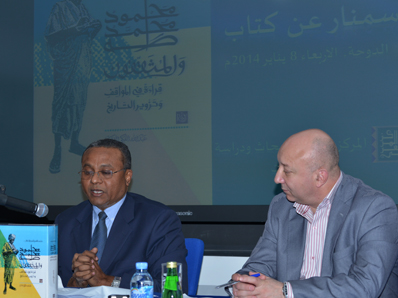The ACRPS weekly seminar, on October 8, 2014 welcomed Professor Abdalla El Fakki El Bashir to present his recent book, The New Understanding of Islam: Mahmoud Mohammed Taha and the Intellectuals – a Reading in Attitudes and Forged History. Through the presentation of the book contents, the guest drew attention to an important aspect of the life of the Sudanese intellectual Mahmoud Mohammad Taha and his ideas, and the attitudes of intellectuals and scholars towards him. He is a personality who aroused great controversy, accused of apostasy, and eventually executed on the morning of Friday, January 18, 1985 in Khartoum. 
The lecture offered a presentation and analysis of the book, which came in five sections and eighteen chapters. El Bashir explained that his study sought to investigate the multiple dimensions of Sudanese intellectual attitudes towards Taha (1909-85), and his project (the new understanding of Islam). The book also explores opinions on Taha's life history, and his sentencing and execution.
The study claims that the death sentence against Mr. Mahmoud was carried out through a broad alliance of traditional political, academic and religious institutions inside and outside Sudan, which attacked his project and accused him of apostasy. The campaign against him inside Sudan was led by the traditional Islamist party together with the intellectual leadership, including the Sudan Scholars Association and the seminary in Omdurman (which is considered the Al-Azhar of Sudan). At a regional level, he was attacked by Al-Azhar and some of its sheikhs in Egypt; the Muslim World League in Saudi Arabia; and other parties whose motivations were far from political.
Taha was first tried and found guilty for apostasy in 1968, and the second in 1985. In 1985, the court used the 1968 ruling as a basis for the second. This judicial assassination was carried out on 18 January 1985 in public, in the presence of statesmen and security and intelligence services.
The lecture was followed by a rich discussion between the lecturer and the audience about the intellectual message of Professor Mahmoud Mohammad Taha, which has returned to Islamic thought and discourse. It was evident through the discussion that the Arab and Muslim world is in need of new ideas based on freethinking, to gain a seat in the international intellectual arena.